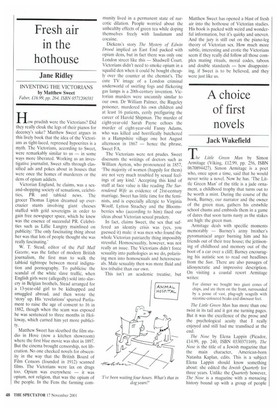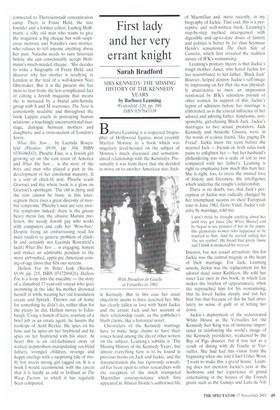A choice of first novels
Jack Wakefield
he Little Green Man by Simon Armitage (Viking, £12.99, pp. 256, ISBN 0670894427). Simon Armitage is a poet who, once upon a time, said that he would never write a novel. Now he has. 'The Little Green Man' of the title is a jade ornament, a childhood trophy that turns out to be worth a mint. During the course of the book, Barney, our narrator and the owner of the green man, gathers his erstwhile school chums and embroils them in a game of dares that soon turns nasty as the stakes are high: the green man.
Armitage deals with specific moments memorably — Barney's army brother's pyromaniacal anger burning him and his friends out of their tree house; the jettisoning of childhood and memory out of the boot of a car over a cliff; Barney encouraging his autistic son to read out headlines from the Sun. There are also passages of idiosyncratic and impressive description. On visiting a coastal resort Armitage writes:
For dinner we bought two giant cones of chips, and ate them on the front, surrounded by a posse of vast, plug-ugly seagulls with nicotine-coloured beaks and dinosaur feet.
The Little Green Man has more than one twist in its tail and it got me turning pages. But it was the excellence of the prose and the psychological acuity that I really enjoyed and still had me transfixed at the end.
The Nose by Elena Lappin (Picador, £14.99, pp. 240, ISBN 0330371169). The Nose is the title of a Jewish magazine that the main character, American-born Natasha Kaplan, edits. This is a subject Elena Lappin should know something about: she edited the Jewish Quarterly for three years. Unlike the Quarterly however, The Nose is a magazine with a menacing history bound up with a group of people
connected to Theresienstadt concentration camp. There is Franz Held, the late founder and a former editor; Ludwig Hoffmann, a silky old man who wants to give the magazine a big cheque but with suspicious motives; and Natasha's own mother, who refuses to tell anyone anything about her past. Natasha needs to turn historian before she can conscionably accept Hoffmann's much-needed cheque. She decides to write a biography of Franz Held, and discover why her mother is testifying in London at the trial of a well-known Nazi film-maker. But it is the present she has most to fear from; the less complicated fact of editing a Jewish magazine that means she is menaced by a brutal anti-Semitic group with S and M overtones. The Nose is consistently readable and throughout the book Lappin excels in portraying human relations: a touchingly unconventional marriage, dialogue between mothers and daughters, and a cross-section of London's Jewry.
What She Saw ... by Lucinda Rosenfeld (Picador, £9.99, pp. 304, ISBN 0330486543). Phoebe Fine, is a Jewish girl growing up on the east coast of America and What She Saw ... is the story of the boys and men who played a part in the development of her emotional maturity. It is a sort of chick-lit noir. Phoebe reads Gramsci and the whole book is a gloss on Gramsci's apothegm: 'The old is dying and the new cannot be born; in this interrelimum there rises a great diversity of morbid symptoms.' Phoebe's men are very morbid symptoms indeed: there is the greasy heavy metal fan, the abusive Marxist professor, the weedy Jewish guy who works with computers and calls her `Woo-boo'. Despite being an embarrassing read for male readers (a generic problem of chicklit and certainly not Lucinda Rosenfeld's fault) What She Saw... is engaging, honest and makes an admirable pendant to the more airbrushed, apple-pie American coming-of-age dross that fills our screens.
Hallam Foe by Peter Jenk (Review, £9.99, pp. 215, ISBN 0747269424). Hallam Foe is a foray into the macabre — the story of a disturbed 17-year-old voyeur who goes swimming in the lake his mother drowned herself in while wearing her old foundation cream and lipstick. Thrown out of home for something he didn't do, rather than for the plenty he did, Hallam moves to Edinburgh. Using a bunch of keys, courtesy of a brief job as an estate agent, he haunts the rooftops of Auld Reekie. He spies on his boss and he spies on her boyfriend and he spies on her boyfriend with his sister. At heart this is an old-fashioned story of wicked stepmothers manipulating sex-blind fathers, wronged children, revenge and happy endings with a surprising tale of misfit boy meets strong girl tagged on. It is a book I would recommend, with the caveat that it is hardly as odd or brilliant as The Wasp Factory, to which it has regularly been compared.























































































 Previous page
Previous page